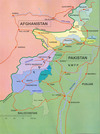The Taliban in South Waziristan have overrun a fort manned by the Frontier Corps in the town of Sararogha. During a massed assault, the Taliban launched a coordinated attack on the military post manned by 42 paramilitary soldiers of the Frontier Corps. The military claimed seven soldiers and up to 50 Taliban were killed. Reports indicate 20 paramilitaries may have been captured by the Taliban.
The Pakistani military confirmed the assault. “Around midnight 400 miscreants attacked the Frontier Corps at Sararogha,” military spokesman Major General Athar Abbas told AFP. “The fort was captured by militants, we are taking stock of the situation.” There are reports of 40 to 50 dead miscreants, while seven personnel embraced martyrdom.” Fifteen of the paramilitaries are said to have escaped, but the “exact location of rest of the FC [Frontier Corps] men in the fort [totaling 20] … is not known,” said Abbas. An unconfirmed report from Xinhua stated 30 troops were killed and up to 100 were killed during the fighting.
The Taliban conducted a well-planned military operation. Reports indicate a force sized from 400 to 1,000 Taliban fighters, indicating a battalion- to brigade-sized assault force. Organizing such a large assault force for a night operation requires planning and training. The Taliban breached the wall of the Sararogha fort using explosives, then rushed through the breach to capture the fort.
|
Presentation on the Taliban leadership in Pakistan and Afghanistan. Baitullah Mehsud pictured. Click to view. |
The Sararogha region, which abuts the Afghan border, is a stronghold of Baitullah Mehsud. Baitullah’s fighters captured a company-sized military convoy in South Waziristan during a complex military operation in early September 2007. The Taliban and al Qaeda operate 29 training camps in North and South Waziristan, and the Taliban have been organizing along the lines of military formations. A senior US intelligence official familiar with the Taliban resurgence in Pakistan who wishes to remain anonymous stated the Taliban have organized militarily at the brigade level, if not higher.
Baitullah is the leader of the newly created Tehrik-i-Taliban Pakistan, or Movement of the Taliban in Pakistan. Baitullah was appointed leader of the orgnaization after a gathering of local Taliban leaders throughout the tribal areas and the Northwest Frontier Province in mid-December. Pakistani intelligence intercepted a communication where Baitullah took credit for Benazir Bhutto’s assassination and stated he was in the town near a Afghan border.
On Jan. 1, 2008, Maulvi Omar, the spokesman for the Movement of the Taliban in Pakistan said the Taliban would “expand its actions from Waziristan to Kohistan and [the] settled districts” unless military operations were halted in Swat. Baitullah has been feuding with pro-al Qaeda and Taliban warlord Mullah Nazir, a rival in South Waziristan.
See The Fall of Northwestern Pakistan: An Online History for more information on the rise of the Taliban and al Qaeda in the Northwest Frontier Province and beyond.










9 Comments
Played with that fire…and the fire burned them. I have NO sympathy for the Pakistanis……they created this monster.
The Thunder Run has linked to this post in the – Web Reconnaissance for 01/16/2008 A short recon of what’s out there that might draw your attention, updated throughout the day…so check back often.
I’m no military man, but it seems to me that some of these Pakistani outposts seem to serve little purpose other than to keep the flag flying in the territories so that the government can maintain the illusion that they have a significant presence. Maybe someone who knows better can tell me different, but these outposts don’t seem to fulfill the roll a forward base fills. They don’t patrol, they seem to have little use in observing insurgent activities, they don’t block the enemy to any real extent, and they don’t help secure the local populous. Add to that many are undermanned and are targets for the insurgents more than bases from which to attack the enemy. Plu they have to be resupplied through vulnerable roads.
I realize that pulling out of forward bases can give the enemy a moral boost, especially if a big deal is made over it. You would think the Pakistani military would do some sort of evaluation and quietly abandon some of the more vulnerable outposts. This needs to be accompanied by more aggressively defending critical bases and assets.
Just my opinion.
I think the moral cost was already paid by the members of the Frontier Corps when the Air Force and helicopters we heard so much about during the “offensive” launched last year around swat did not show up…
It is shortsighted to see this fighting as a problem rather than an opportunity. As documented in the quote below, much of the support for the Taliban in the Pashtun provinces of Pakistan is support for Pashtun separatism, not Islamic radicalism.
As James Taranto of the Wall street Journal suggested (http://www.opinionjournal.com/best/?id=110011047) if “Islamabad can’t govern western Pakistan–an ethnically distinct, mostly Pashtun, area–maybe a way could be found to cut the region free, either by granting it independence or incorporating it into Afghanistan.”
Pakistan is a problem because of the radicalism in Pashtun areas and the nuclear weapons in non-Pashtun areas. If the radicalism and the nuclear weapons are separated by a border, the radicalism will be less of a problem. The support for radicals will diminish once separatism is achieved, and there will be a strong drive to join with the Pashtuns who are the dominant ethnic group in Afghanistan. Afghanistan, once dismissed as ungovernable, is doing well, at least when compared to the Pashtun areas of Pakistan.
We should see Pashtun separatism in Pakistan as an opportunity, not a problem.
Taliban separatism quote:
http://www.iht.com/articles/2007/08/01/opinion/edharrison.php
The alarming growth of Al Qaeda and the Taliban in the Pashtun tribal region of northwest Pakistan and southern Afghanistan is usually attributed to the popularity of their messianic brand of Islam and to covert help from Pakistani intelligence agencies.
But another, more ominous reason also explains their success: their symbiotic relationship with a simmering Pashtun separatist movement that could lead to the unification of the estimated 41 million Pashtuns on both sides of the border, the breakup of Pakistan and Afghanistan, and the emergence of a new national entity, “Pashtunistan,” under radical Islamist leadership.
Could someone explain why this article seems to presume that the Pakistani government still controls the territory but that the introduction to the series recommended at the bottom and dated in 2006 seems to indicate that Waziristan was already then under the Taliban.
I don’t really have time to read all the stories here right now though I will make an effort to come back some time (first visit). A time-line would be nice.
[i said]
Never mind … the list of stories following the introduction page serves very well … I was mislead by the Sept 13, 2006 date at the top of the page.
My other question is still open ;-).
gh,
The Taliban have run South Waziristan openly since the March 2006 South Waziristan Accord. The truce was dropped after the Paksitani military moved some units back into the tribal areas in the summer of 2007. But the Taliban controls South Waziristan. The military may man some fort (two less after today) but that is the extent of their control.
Until the camps, the strongholds in the tribal belt are eliminated, there will be no peace in a-stan. Sooner or later, the US must decide to cross the border and risk the corrupt and treacherous regime of Mush., or keep flushing billions down the latrine and watch the inept p-stani army do NOTHING. It can get worse, but i think we should act and destroy the 30 or so camps, maybe bag a couple HVT’s along the way. To do nothing is like fighting the Vietnam War all over again. There should be NO safe havens for AQ/T-ban. The p-stani gov. does not even own these areas. It is a seperate entity, with its own gov. and defense [terrorists] force. I say take ’em down.